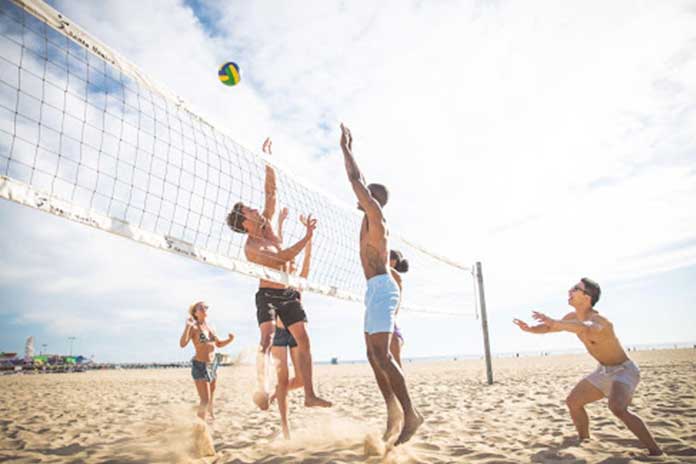Whether you play a summer sport or just want to condition before your season starts in the fall, summer is a great time to get serious about your training. Here are nine ways to prepare for summer sports, from staying cool during practice to hydrating sufficiently. Grab your water bottle and your sports mouthguard and let’s hit the field!
Table of Contents
Slowly acclimate to the heat.
Heat stresses your body in addition to your workout, so you need to slowly acclimate to exercising during hotter temperatures. Start with short, less intense workouts, and then gradually increase the length and intensity until you are exercising at peak performance. Keep in mind that heat saps your strength, so your peak performance during the summertime might look different from your performance during the cooler days of spring and fall.
Work out during the coolest hours.
If you need to do outdoor practices or workouts during the summer, and you have control over your schedule, then try to work out in the coolest hours of the morning, just before and after dawn. If you must work out later in the day, in the evening around sunset is the second best time. However, it will not be as cool as the morning because the ground absorbs heat from the sun during the day, and that takes a while to dissipate. Thus, mornings are the safest time to work out during the summer if you can manage the pre-dawn wake-up time.
Take rest breaks.
Rest breaks during practices and workouts are essential for preventing dehydration during the summer. You might find yourself needing to take more breaks than you do in cooler weather; this is totally normal and is to be expected. If you start feeling nauseous or dizzy, stop right away and find a shady spot to rest — that could be a sign of impending heat exhaustion (more on this in a second). It’s always better to take a rest break or cut your workout short than to push yourself too hard and then have to take multiple days off to recover.
Cool down during practice.
There are several strategies that you can use to stay cool during practice no matter what time of day you exercise. When you take breaks, try placing cold towels on your forehead, neck, armpits and wrists to cool yourself down quickly. If you need to cool down on the go, then use a spray bottle to mist cold water all over yourself. The water will act like sweat, immediately cooling you down thanks to the power of evaporation. If you don’t want to carry around a full-size spray bottle, grab a mini one from the travel toiletries section instead.
Hydrate the right way.
Chugging a bunch of water right before a workout will only make your stomach churn. Instead, hydrate throughout the day and night to prevent dehydration. Small but frequent sips are easier for your body to absorb than infrequent, larger gulps. If your workouts or practices last longer than 60 minutes, you will likely want to try sports drinks or electrolyte powders in order to replace the electrolytes you are losing for your sweat. Choose a squirt bottle that you can easily drink from without removing your cool mouthguard to make it easier to sip more frequently.
Eat a nutritious diet.
You get most of your nutrients from your food, not your drinks, so it’s important to eat a healthy diet. You will need to eat nutritious carbs such as whole grains and produce in order to keep up your energy, and also consume lean protein to give your body the fuel it needs to rebuild itself after your workouts. You will also need to eat moderate amounts of healthy fats such as olive oil and avocados. Proper nutrition will help you keep competing at top levels even during the sweltering summer heat.
Get plenty of sleep.
Heat tires you out, doubly so if you are exercising in it — so don’t be surprised if you need more sleep during the summer than usual. Most adults need a minimum of seven to nine9 hours a night, and many athletes need more in order for their bodies to recover. If you’re constantly feeling fatigued, but you’re drinking enough water and eating healthily, then check your sleep schedule. You simply might not be sleeping enough to recover from your workouts.
Know the signs of dehydration and heat illnesses.
Feeling a little bit off during your workout? You might be headed toward heat exhaustion, which occurs when dehydration combines with heat exposure. Heat exhaustion is a serious condition that can progress to heat stroke — which can be fatal — if left untreated.
Signs to watch out for include dizziness, headaches, nausea, vomiting, muscle cramps, weakness, tiredness, paleness, either heavy sweating or no sweating, cold and clammy skin, fast and weak pulse and fainting. Stop if you feel any of these symptoms and immediately seek shade and try to hydrate. If your condition does not improve soon, call 911 for help.
Consider switching up your training program.
After we do the same workouts for a number of weeks or months, our bodies get acclimated to them and they no longer challenge us as much as they once did. If you’ve been getting to that point, then summer is the perfect time to get out of your training rut and switch up your routine. If you live somewhere really hot, consider moving your outdoor workouts inside for safety reasons until the weather cools off again.
When the sun shines brighter than a gold teeth mouthguard, preparation is essential for being able to train safely. Follow all these tips to get ready for summer sports as the weather heats up.
Also Read: How Dangerous Are Sports With Infections?


